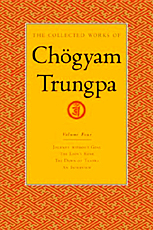About Chögyam Trungpa and His Collected Works:
Chögyam Trungpa (1939 - 1987), a Tibetan meditation master, teacher, and artist is widely known as one of the pioneers in bringing Buddhism to the West. He was born in eastern Tibet and was identified as the eleventh descendent in the line of Trungpa tulkus (incarnations of teachers). At age 18, this scholar was Supreme Abbot of the Surmang Monasteries. He fled to India when the Chinese invaded his homeland in 1959. In 1963, Chögyam Trungpa traveled to England where he attended Oxford University as a Spaulding Fellow, studying Western philosophy, religion, art, and language. He established the first Tibetan Buddhist center in Scotland in 1967.
In 1970, he was invited to teach in the United States; he settled down in Boulder, Colorado. Over the years, he established over 100 meditation centers in America, Canada, and Europe. Trungpa Rinpoche set up Shambhala International in 1973 to coordinate the activities of these centers. He also founded Naropa Institute (now Naropa University), an innovative college that combines contemplative studies with a liberal arts curriculum. A secular program for meditation called Shambhala Training was established in 1976. In 1986, Trungpa Rinpoche moved the center of his activities from Boulder to Halifax, Canada, where he died the following year.
Carolyn Rose Gimian, editor of The Essential Chögyam Trungpa (1999), is the compiler and editor of The Collected Works of Chögyam Trungpa. In each of these eight volumes, she provides an overview of the material.
About This Volume:
This volume contains explanations of the tantric teachings of Tibetan Buddhism, especially insights into psychology and spirituality. Journey Without Goal: The Tantric Wisdom of the Buddha (1981) explores the practice of meditation, the discovery of egolessnesss, the mandala principle, and the difference between Buddhist and Hindu tantra. The Lion's Roar: An Introduction to Tantra (1992) probes the crazy wisdom of this path which includes a blend of perceptiveness, fearlessness, and bluntness. The Dawn of Tantra (1975) is an overview presented by Chögyam Trungpa and Herbert V. Guenther on many aspects of ancient Tibetan teachings including the mandala principle, the guru-disciple relationship, and visualization. The closing interview, from 1976, has Chögyam Trungpa discussing the meaning of his 1969 accident in England and his subsequent mission to the United States.
